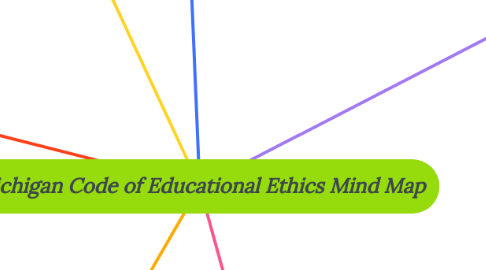
1. 6. Responsible and Ethical Use of Technology
1.1. Responsible Use
1.1.1. Use technology appropriately and transparently
1.1.2. Promote the benefits and clarify the limitations of technology
1.1.3. Maintain separate professional and personal virtual profiles
1.2. Student Safety
1.2.1. Protect students from inappropriate or harmful content
1.2.2. Monitor and report cyberbullying incidents
1.3. Confidentiality
1.3.1. Maintain confidentiality in the use of technology
1.3.2. Protect student information and educational records
2. 1. Responsibility to the Profession
2.1. Professional Conduct
2.1.1. Uphold ethical standards and stay informed about policies and regulations
2.1.2. Regularly attend professional development sessions
2.1.3. Know and uphold procedures, policies, laws, and regulations
2.1.4. Monitor and maintain mental, physical, and emotional health
2.1.5. Avoid personal gain and impropriety
2.1.6. Take responsibility and credit only for work performed
2.2. Advancing the Profession
2.2.1. Participate in professional organizations
2.2.2. Support decisions and actions that positively impact teaching and learning
2.2.3. Engage in respectful discourse on professional issues
2.2.4. Advocate for adequate resources and facilities for students
2.3. Addressing Ethical Issues
2.3.1. Confront and resolve ethical dilemmas proactively
2.3.2. Maintain fidelity to the Code
2.3.3. Neither discriminate nor retaliate against individuals making ethical complaints
2.3.4. Cooperate fully during ethics investigations
3. 2. Responsibility for Professional Competence
3.1. High Standards of Practice
3.1.1. Incorporate state and national standards into teaching
3.1.2. Reflect on and assess professional skills and competency
3.1.3. Commit to ongoing professional learning
3.2. Use of Data and Research
3.2.1. Use data and research responsibly
3.2.2. Conduct research ethically and responsibly
3.2.3. Use evidence and data to inform practice
3.2.4. Maintain and protect data records according to laws and policies
4. 4. Responsibility to Students
4.1. Trust and Confidentiality
4.1.1. Maintain confidentiality and trust in student interactions
4.1.2. Protect the confidentiality of student records
4.2. Respect and Dignity
4.2.1. Treat students with respect, considering their diverse backgrounds
4.2.2. Communicate clearly, respectfully, and culturally sensitively
4.2.3. Avoid inappropriate relationships with students
4.3. Ethic of Care
4.3.1. Understand and respond to students’ needs
4.3.2. Promote students' emotional, intellectual, and physical safety
5. 3. Best Interest of Students
5.1. Work to close achievement gaps and ensure equitable access to education
5.2. Engage the school community to support student achievement
5.3. Protect students from harmful practices
6. 5. Responsibility to the School Community
6.1. Relationships with Parents/Guardians
6.1.1. Communicate effectively and respectfully
6.1.2. Maintain confidentiality with respect to student information
6.2. Relationships with Colleagues
6.2.1. Collaborate and support fellow educators
6.2.2. Resolve conflicts privately and respectfully
6.2.3. Share educational records appropriately and objectively
6.3. Community Engagement
6.3.1. Advocate for policies that benefit students and families
6.3.2. Collaborate with community agencies and organizations
6.3.3. Maintain professional standards when representing the school or district
6.4. Relationships with Employers
6.4.1. Use property, facilities, materials, and resources responsibly
6.4.2. Respect intellectual property ownership rights
6.4.3. Exhibit conduct that is in the best interest of the organization and profession
